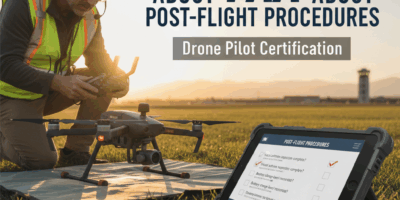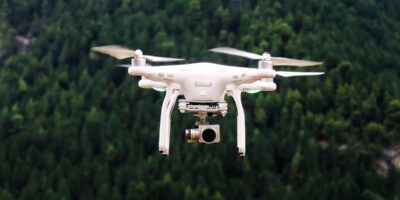Common Mistakes on the Drone Operator Exam

Many aspiring drone operators underestimate the complexity of the drone operator exam. Getting familiar with these common pitfalls can better prepare you for the test. Let’s dive right into some of the typical mistakes candidates make.
1. Neglecting Weather Knowledge
Weather understanding is vital for drone operators. Many exam questions focus on interpreting weather patterns. Overlooking this can lead to underpreparation. Study how weather impacts drone flights, particularly wind, precipitation, and cloud cover. Understand terms like ‘fronts,’ ‘pressure systems,’ and ‘microclimates.’
2. Ignoring Regulations
Drone operation is heavily regulated. Candidates often skip over federal, state, and local guidelines. This section isn’t just about memorizing laws. It’s understanding their practical application. Know airspace classifications, flight restrictions, and necessary permits. Stay updated since regulations evolve.
3. Skipping Over Technical Knowledge
Technical questions cover the mechanics of drones and their components. Don’t assume common sense will get you through. Study the functions and characteristics of different drone parts. Learn about battery life, signal interference, and GPS systems. Pay attention to the nitty-gritty details.
4. Underestimating Flight Theory
The principles of flight govern how drones operate. This includes aerodynamics, lift, thrust, drag, and weight. Candidates frequently skip these basics. Understanding these concepts can help answer scenario-based questions. Get comfortable with fundamental physics as it applies to aviation.
5. Lack of Practice with Sample Questions
Practicing with sample questions is non-negotiable. This exposes you to the exam format and the types of questions asked. It also highlights areas needing more study. Not using these resources is a misstep. Find reputable sources and take as many practice exams as possible.
6. Inadequate Time Management
Time management during the exam is crucial. Candidates often spend too much time on tough questions. This neglects easier ones they could answer quickly. Practice timed tests to get a feel for pacing. Develop a strategy for when to move on from difficult questions.
7. Misinterpreting Chart Information
Exams often include questions based on charts and maps. Misreading these can lead to wrong answers. Pay attention to legend symbols, scale, and orientation. Practice interpreting various types of charts, particularly aeronautical ones. Understanding key elements helps in quick, accurate analysis.
8. Overlooking Battery Management
Battery management is a critical safety topic. Questions may cover best practices and troubleshooting. Don’t just know how to charge a battery, understand peak performance management, storage, and disposal. Learn about lithium-polymer (LiPo) battery characteristics specifically. Neglecting this can cost valuable points.
9. Forgetting Emergency Protocols
Emergency protocols are essential knowledge for operators. These include dealing with lost communication, malfunctioning drones, and emergency landings. Memorize step-by-step procedures for various emergencies. Understand how to apply this knowledge in different scenarios.
10. Poor Pre-Flight Checklist Familiarity
The pre-flight checklist ensures all safety measures are accounted for. Familiarize yourself with a standard checklist and its items. Know how to conduct each part thoroughly. This includes equipment checks, weather assessment, and risk management.
11. Overreliance on Automation
Modern drones are equipped with advanced automation features. Relying heavily on these features can be a mistake. Understand manual control and when it’s necessary. Situations like signal loss or software failure require manual expertise. Balance automated and manual skills.
12. Not Reviewing Airspace Classes
Airspace classes define where and how drones can be operated. Misunderstanding these can lead to jurisdictional issues. Study the different classes (A, B, C, D, E, G) and their restrictions. Know where you can and cannot fly without requiring additional permissions.
13. Disregarding Human Factor Considerations
Human factors include issues like fatigue, stress, and situational awareness. These impact decision-making during flight operations. The exam may include questions on how these factors affect performance. Study how to mitigate human errors through proper preparation and discipline.
14. Inadequate Maintenance Knowledge
Maintenance ensures drone longevity and reliability. Candidates often overlook routine maintenance tasks. Learn basic repair and maintenance steps for all drone parts. Regular checks prevent in-flight failures and enhance performance. Know the signs of wear and needed action.
15. Failing to Understand Camera Settings
Drones often operate with onboard cameras. Understanding camera settings and functionalities is important. This includes knowledge about resolution, frame rates, and exposure. Familiarize yourself with how to adjust these settings based on different conditions and requirements.
16. Not Knowing How to Update Firmware
Keeping drone firmware updated is critical for optimal performance. The exam may test on the process for updating firmware. Understand how to check for updates, download them, and install them. Also, learn about troubleshooting common update issues.
17. Misjudging Manual vs Auto Flight Modes
Drones offer both manual and automatic flight modes. Know when each mode is appropriate. Over-reliance on auto modes or inability to switch to manual when necessary can be problematic. Study the strengths and limitations of each mode for different flight conditions.
18. Overlooking Payload Management
Payload affects flight dynamics. Mismanagement can cause balance issues and flight inefficiencies. Learn how different payloads affect your drone’s performance. Understand how to attach, secure, and balance payloads properly.
19. Lack of Understanding of RF Interference
Radio frequency (RF) interference can disrupt drone operations. Learn how to recognize and mitigate RF interference. This includes knowing sources of interference and how to avoid them. Study how different environments impact signal strength and control.
20. Not Preparing for Night Operations
The exam may cover regulations and best practices for night flights. Understand lighting requirements and additional safety protocols. Know about enhanced pre-flight procedures for night operations. Study visibility considerations and how to mitigate risks during nighttime flights.
“`



